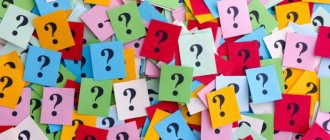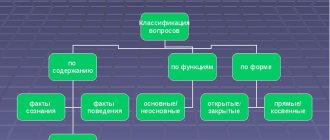Author of the material:
Alina Tarasova
entrepreneur, writer, life coach
The ability to ask the right questions makes it easier to communicate with a person. This is as true for sales as it is for coaching or personal conversations. An effective dialogue tool is open questions. What are they and how can you learn to ask them? How are they useful? Why do coaches, trainers, and sales consultants focus so much on open-ended questions? Is it possible to do without them? Let's try to answer all of this. And to make it easier to understand open questions, examples of them will also be given in the publication.
What questions exist in Russian?
In this work we will look at 5 types of questions. There are a number of other classifications, the number of questions in which may vary, but today we will focus on this one.
So, according to our classification, there are five types of questions: closed, open, turning points, rhetorical, questions for reflection. Note that open and closed questions are distinguished in almost all types of classifications. This fact makes them basic.
Now let's look at each type in more detail, and also give examples.
Open, closed and alternative questions in sales (part 1)
Let’s pay tribute to tradition and begin the classification of questions with open, closed and alternative, but we will not limit ourselves to them, we will also analyze other types that are no less important for sales. If you, like most salespeople I know, have known everything about these three types of questions for a long time, you can immediately proceed to the division into divergent and convergent questions.
An example of questions that are identical in essence and different in form:
When is it convenient for you? - open question.
Are you comfortable today? - closed version of the question.
Are you comfortable today or tomorrow? - an alternative form of the question.
Open questions in sales
study and create
An open question from the seller assumes (but does not guarantee) a detailed answer from the client and begins:
1) upon request:
- Please tell us about...
2) with question words:
- What?
- How? How often? How?
- Which? Which?
- Who?
- Whose?
- Where? Where? Where?
- When?
- How many?
- For what?
But “Why?” should be used with caution, this question has accusatory overtones.
Using Selling Open Questions
Of all the sales tools, open-ended questions have perhaps the widest range of applications.
With their help you can:
1. Talk, “relax” and win over the client. In conflict situations, lower the “degree” of the conversation.
2. Seize and maintain the initiative.
3. Stimulate and direct thinking, make the interlocutor think, “turn on” analysis, evaluate your past, present or future, decision and alternatives.
4. Form, strengthen or weaken a need.
5. Change attitude, generate an idea or doubt.
6. Identify, as well as strengthen or weaken emotions, attitudes, fears.
7. Get information.
8. Close the deal (even though this is considered the traditional domain of closed and alternative issues).
This list inspires me. And you?
Almost all good selling questions are open-ended, for example:
Which model are you interested in? What are you interested in, what should you talk about? — establish contact and take the initiative.
What is important to you? What did you use before? — we identify decision-making criteria.
How do you usually make such decisions? — we receive valuable information.
What have you already watched? What did you like? What alternatives are you considering? — we understand the competitive environment, the stage of purchase or work with an objection.
How will you use it? What tasks might be added over time? But where can you use this opportunity? — laying the foundation for increasing the check.
How long do you plan to use it? Under what conditions will it be used? — we play with the selection criteria.
Open-ended questions have only one drawback - they lengthen the conversation. Therefore, it is very funny when managers verbally demand that needs be identified, but in reality set KPIs for managers based on the duration of the conversation. It is difficult to listen to the client and ask open-ended questions when the meter is ticking, and every minute of the conversation costs you money.
Closed questions in sales
We put the client before a choice
Closed questions have only two answer options - “YES” or “NO” and help to quickly get an unambiguous answer from the client. This is useful when you need:
- test hypotheses, clarify whether the seller understood the buyer correctly;
- record agreements and responsibilities.
For sales and negotiations, this is where the advantages of closed questions end and the disadvantages and features begin.
The danger of closed questions in sales
Firstly, closed questions, like alternative questions, “close” the conversation.
“Yes, yes, no, yes” - dry short answers do not leave room for unnecessary words and halftones from which communication is woven, and break contact. This feature can be used in negotiations: several alternative and closed questions asked in a row help to curtail chatter with an overly talkative client.
Secondly, a closed question is a requirement to “decide here and now”, to make an unambiguous decision.
This crystal clarity is often not needed by either the client or the seller. Let's look at two of the most common examples of the dangerous use of closed questions in sales: at the very beginning of a conversation and at the stage of receiving a reaction to a commercial proposal.
Closed questions are parasites at the beginning of a conversation with a client.
This mistake is most critical in active selling: We are engaged in... Could this interest you?
The question seems to be “innocent”, but it turns the whole sale upside down. With proper negotiation, the manager first identifies needs, then advertises the satisfaction of these needs, then offers to buy.
Question: “Would this interest you?” - this is the completion of the transaction. Jumping through several stages, the seller resembles Lieutenant Rzhevsky from the bearded joke. Experience suggests that the conversion rate of this approach is low, and the probability of the “in the face” option tends to 100%.
To the second closed parasitic question: “Have you heard of our company?” – I propose to look through the advanced prism of manipulation and evaluate what social roles this innocent question can “switch on” in the interlocutor:
First option:
- Have you heard about us?
- No, I haven’t heard.
The seller's closed question with a slight movement turned a potential client into a person who is approached by some complete strangers, and we were all taught in childhood that we should not talk to any strangers.
Second option:
- Have you heard about us?
- Yes, I heard.
At first glance, this option is better, but only at first glance. If you “slightly scratch” the agreement, you will see a refusal: Yes, I heard, but since I heard and still haven’t bought it, it means it’s not necessary. The client included the role of a person who has already decided not to buy.
In both cases, the manager, trying to establish contact using a closed question, starts from the “point of failure” instead of looking for common ground. I think that in these cases the reason for the error in the form of the question is purely psychological: it is difficult for the seller to deal with the indifference of clients day after day, he wants to see the light at the end of the tunnel as soon as possible, to hear the first yes.
Make it a rule that the first few questions should be open-ended. (There are exceptions to any rule, for example, in telephone sales of expensive ceramic tiles and other similar products, the starting closed question works ideally: “Have you already seen it in person?”)
Closed questions during the feedback phase after a presentation or proposal
With the situation when the client 100% agrees, everything is simple; let’s look at the option when the buyer has doubts. Compare:
1)
—Are you ready to buy? (closed question requiring a decision)
- No.
Now the seller will have to work with the refusal. And buyers are consistent people and are accustomed to defending decisions already made.
2)
- What do you think? (open question inviting sharing of attitude)
- Well, I'm not sure this suits us...
- What exactly is alarming? / What are you comparing it to, what alternatives are there?
In the second case, the client expressed an opinion, not a decision. It’s easier to “work” with an opinion than with a refusal.
Why do salespeople continue to ask “bad” closed-ended questions instead of the right open-ended ones?
All the fuss about dividing questions into open and closed is due to the fact that “by default” we use the closed formulation. This is how our psyche works: we look at the world around us, build hypotheses, and then test them, go through the options that come to our mind.
Are you worried about the weather?
Are you feeling bad today?
Had a fight with whom?
... and so on, instead of just asking: What are you thinking about?
It’s strange that even in sales theory there are such “guessing games”, for example:
The question is searching for landmarks . It is asked when the Client keeps his doubt to himself, cherishes it and does not want to give it to anyone. Usually this is a series of questions with which we “probe” what worries our interlocutor: “Are your doubts related to...?”, “Perhaps you are not satisfied with...?”, “Did you like...?”
Guessing games are dangerous. Our brain already makes a million assumptions per minute. We are simply woven from them, and we have a thousand hypotheses regarding the client. It is assumptions that prevent us from asking normal questions and actively listening.
If you see that the client is “closed”, do not play the guessing game. Use the link: “verbalization of emotions or situation + open question”:
Today you are taciturn. What's troubling?
or
It seems to me that you are in doubt... What do you think about this option? Help me find alternatives. What you like and what you don’t.
Turning hypotheses into open questions
It is symbolic that 80% of the notes on closed questions are devoted to open ones. Almost always, a closed question can be replaced with an open one, and it will only be better. For example, even the sacred closed question: “Do we arrange delivery?” – will improve in the options: “Which address should we deliver to?”, “What delivery time is convenient?”
It is according to this scheme that a novice salesman is a guesser and can turn into an experienced master of selling open questions:
1. A hypothesis comes to mind.
2. You formulate it in the form of a closed question.
3. You “catch yourself by the tongue” and reformulate a closed question into an open one.
4. You “taste” the open question, polish it and turn it into the perfect selling open question.
Practice, write 10 connectives similar to my example:
Alternative questions in sales
limiting options
Alternative questions are choices without choices. The seller ignores the question of whether the client wants to meet, buy, call, and is interested in which of the options that suit him is more convenient for the interlocutor.
With all my love for open questions, alternative ones have their undeniable advantage - a clear internal logic. They already contain an algorithm and help to find a solution. It’s easy and pleasant to answer the client; there’s no need to strain or think. It’s not for nothing that all food filters are built on the conjunction “or”.
Like closed questions, alternative filters work great on the site, but break communication when communicating with a live seller. We love taking tests, but we get tense when we are tested. We don't want to talk to the algorithm.
Alternative questions are softer than closed questions, easier than open ones, but at the same time they are quite blatant manipulation, and clients know or feel it. Therefore, you should not overdo it and include obviously inconvenient options. For example, when arranging a meeting with a b2b client, you would not suggest: “Wednesday afternoon or Sunday morning.” Be attentive to the client, select real alternatives from which the buyer is comfortable choosing.
Using alternative questions in sales:
Seize the initiative
An alternative question at the beginning of a conversation followed by a transition to open questions can be used to seize the initiative in sales to “hot” customers (incoming calls, retail sales in a store or salon). Examples:
- Are you choosing for yourself or a client?
- Have you already decided or are you considering alternatives? This question helps both to suggest another solution and to navigate the purchasing stage.
Make appointment
In the morning or afternoon? At 11 or 16?
Firstly, this is a classic appointment in active sales, the only thing missing is the “bearded”: Do you have your diary at hand?
Secondly, when making an appointment with a specialist, for example a doctor, the alternative form of the question both sets a framework that is convenient for the company (we are trying first of all to “occupy” a time that is not the most popular) and creates a useful slight stir (it’s scary to go to a specialist whose entire appointment is free : “choose any time”).
Get the ball rolling on identifying needs
There are clients who “don’t know what they want at all,” and open-ended questions confuse them. There are “silent people”. A chain of questions will help both of them to talk: 1 - 2 alternative ones, then narrow or reference ones (we will look at them in the continuation of this article), and you can move on to open ones.
Find a solution to a controversial situation
We can do 1, 2 or 3. Which option is preferable?
An alternative question perfectly moves the conversation from the plane of “who is to blame” to a constructive direction: “what to do.”
State the price correctly
An alternative question will help either determine the client’s budget or set a favorable starting point for submitting a price:
In what range do we look at the options: up to 10,000, from 10 to 20, expensive?
Basic equipment or complete stuffing?
Neither open-ended nor closed-ended questions are suitable for this task.
Complete the deal
Closing a deal quickly is the most common example of using alternative questions in sales:
Which option did you choose: red or green?
Payment by cash or card?
Delivery or pickup?
Cash or credit?
Do you want a gift or a discount?
What types of questions to use in sales?
Let’s summarize the comparison of the main types of questions used in sales.
Default to open-ended language. Firstly, you can’t go wrong this way, because in most cases an open-ended question is better than its more “limited” counterparts. Secondly, this rule protects you from playing guessing games and unknowingly using closed questions.
Closed and alternative questions play a supporting role in sales. Use them consciously and precisely, in situations where you are firmly convinced that they will perform this specific negotiation task better than a classic open-ended selling question.
Questions are perhaps my favorite topic in sales, and in all my trainings I devote a lot of time and attention to correct, well-honed formulations, and the skill of identifying needs and managing the conversation. Contact us!
Nikolay Shevyrov, business coach.
Open question
Open questions are questions that require a detailed answer and some explanation. It is impossible to answer them either “yes” or “no”. Such questions begin with the following interrogative words: “how”, “who”, “what”, “why”, “how much”, “which”, etc.
Such questions allow your interlocutor to choose the information to answer at his own discretion. On the one hand, this can lead to the interlocutor hiding something that he does not want to disclose. But on the other hand, if in a suitable emotional situation, the interlocutor can open up and tell much more than the question you asked required.
Open-ended questions allow you to turn your monologue into a conversation. However, there is a danger that you will lose control of the conversation and it will be difficult to regain control.
Here are examples of such questions:
- Why do you want to study at our university?
- When did you decide to agree to this conversation?
- How much do you earn per month?
- Who cleans your home?
- What do you usually do in the evenings?
How to stimulate the thinking process
14. Break questions into logical parts:
If you need to ask what participants like or dislike, you'll find that you'll get more answers to your question if you break it into two open-ended questions in separate boxes ("likes" and "dislikes"). I often see open-ended questions that try to combine several separate questions at once. My advice is to break them down into logical chunks and ask separate questions about the specific topics you need to figure out. You can group these questions together so that they fall under the same topic you want to clarify, but this tactic will always allow you to get higher quality feedback.
15. Use different methods of stimulation:
The ability to offer respondents a variety of incentives can be an incredibly powerful tool for generating ideas. Let's say you want participants to come up with a new type of ice cream. In this case, you can offer them about 20 different ideas that will help respondents look at the subject from different points of view. This can be anything, for example: “If Lady Gaga created her own ice cream, what would it be?”, “Create an ice cream that you could eat during the cold season”, “Create an ice cream that you think you will like” football fans”, etc. – the more abstract the wording, the better, and at the same time you offer each of the respondents a random set of options, one option for each question.
16. Set rules:
I have already talked about this technique in one of my works on gamification of research, but I would like to emphasize again that adding a rule to a question can make the process of answering it much more interesting and exciting for respondents and, thus, ensure you receive more thoughtful feedback. The simplest way to use this technique is to set a word limit, for example: describe this movie in three words.
17. Personalize your questions:
Remember that you are essentially a person communicating with another person, and for most people their favorite topic of conversation is themselves, so try to frame the question in a personalized context whenever possible. Instead of asking, “Why do you like this brand?” you could ask, “If a friend asked you what you thought of this brand, what would you say?”
18. Use the power of the word “imagine”:
The word “imagine” has a special magic that makes people think. We conducted an experiment in which we asked participants in one group to make a list of their favorite stores, and participants in another group were told: “Imagine that you are designing your own ideal shopping center. What kind of stores would you put in it?” – this phrase allowed us to quadruple the amount of feedback received.
19. Use neurolinguistic programming methods:
I don't claim to be an expert in this area, but the concept of embedding an order into a question can be extremely powerful. I might ask you, “Describe what you do in seven words,” or I might ask you, “Describe what you do in JUST 7 words.” Respondents seem to perceive the word “ONLY” as a stronger command, and therefore it generates more responses.
20. Study the form of asking a question:
It's quite interesting to see which specific discussion topics posted on Linkedin generate the most interest from members and the most responses. By studying them, you can get an idea of how exactly you should phrase questions to get more response.
Closed question
Closed-type questions are those that can be answered either “yes” or “no.” The particle “whether” is often used in closed questions. They limit the freedom of the interlocutor as much as possible, leading him to a monosyllabic answer.
By asking these kinds of questions, you can keep the conversation under control. However, the interlocutor cannot express his opinion or share ideas.
In addition, closed questions have a number of negative features:
- the information obtained when answering them will be superficial;
- two answer options create the impression of coercion, so the interlocutor will gradually feel more and more uncomfortable, which will ultimately lead to the fact that he will want to end the conversation as soon as possible;
- they lead to the interlocutor’s reluctance to open up and provide more information.
Closed questions are recommended for use in cases where it is necessary to collect a lot of information in a short period of time. For example, when conducting various studies. If you plan to get to know your interlocutor better and expect that your acquaintance will continue, you should definitely alternate closed questions with open ones, allowing your partner to speak out.
Examples:
- Do you like running?
- Would you like to learn to swim?
- Do you play musical instruments?
Top 100 questions for quiz
- Who owns The Garden restaurant?
- What is the name of the most famous observation deck in Moscow?
- The famous code from The Matrix actually means...
- What was created thanks to mold fungi?
- What in the sea is a reference point for a sailor?
- What is added to cabbage soup according to old Russian recipes?
- Name the country with the highest life expectancy.
- What does the devil wear in the famous movie?
- Who does the girl want to dance with in the famous Soviet song?
- What was the name of Macedonsky's mother?
- The most viewed video hosting site on the Internet is...
- What does it mean to “pull the rubber”?
- A Navy recruit is...
- What does a person who always maintains his reputation do?
- In what type of swimming do they begin to swim straight out of the water?
- What is Herostratus famous for?
- A miniature copy of a Greyhound is...
- At what age does longevity begin?
- Which dance is considered the most passionate?
- Which peak is difficult to conquer?
- What do you call a person who plays a role poorly?
- How can you talk on the phone while driving?
- When is the Old New Year celebrated?
- What is the name of a line that has no ends?
- Name the capital city of the Republic of Belarus.
- A firewall is...
- Who wrote "Irises"?
- What word was used to call a water clock in ancient times?
- Who was Genghis Khan?
- Where was Carlson's control panel located?
- My years are mine...
- What is bee glue called?
- Name the name of the US ships created for the purpose of flying to the Moon.
- The great harelip is...
- Drawing paper is called...
- This is what the front seats in cars are installed on. Name this equipment.
- What is the old name for a soft women's bag?
- What is the average temperature of a bird?
- How long do speed skaters cover in sports?
- Londonderry is located in…
- Continue the song: “We will not forget our calling, we will laugh and joy...”
- The sculpture “The Bronze Horseman” is dedicated to...
- The main weapon of a hockey player is...
- Who became the husband of Thumbelina from the famous fairy tale?
- Where does the soul go when it gets scared?
- Who in the story let Hottabych out of the jug?
- Along with a glass of cognac in Russia they usually ask for...
- Name Chernyshevsky’s work, which has a title in the form of a question.
- What question can Hamlet not answer?
- What is the main ingredient needed to make pies?
- Name the main TV tower in Russia.
- How many kilometers are in one mile?
- How long did the Hundred Years' War last?
- Decipher the abbreviation NATO.
- How many republics does EurAsEC unite?
- Which month has 28 days?
- Which fruit is the object of contention?
- Where did World War 1 start?
- Who owns the tragedy Hamlet?
- What is the name of the doctor who treats veins in the legs?
- What does the conductor wear at the concert?
- Name the tower on which the Kremlin chimes are located.
- Where did they post photos of the best of the best in the USSR?
- What is the condition called when a man/woman loves one person all their life?
- What do beavers get from construction?
- Name one of the epithets of black eyes.
- Based on the name of the popular series, it is at this time that the shadows disappear. When?
- What is the name of a ruler under a small monarch?
- Sulfur hexafluoride, according to energy experts, is...
- It is this country that gives Great Britain a beautiful spruce for Christmas. Which?
- What is the name of your wife Vasisualia Lokhankina?
- What number is the devil's dozen?
- You will find this person both at church and at a football match.
- Who is the first to greet a hotel visitor?
- This piece on the chessboard only makes a diagonal move. Which?
- The expansion of monitors is measured in...
- Name the position of the person working at the embassy - press...
- Who does the useless sending of unnecessary emails on the Internet?
- Name the object around which everything revolves in the heliocentric system.
- These are the animals that are kept in sheds. Which ones?
- Who is considered the hero of our time according to Russian classics?
- The choral song begins with...
- Munchausen flew on...
- The shark does not have this part. Which?
- In the Scottish costume, an ordinary piece of furniture is an element of the national costume. Which?
- This man was responsible for the daily supply of troops in the army under the king. Who?
- It was this type of transport that greeted Lenin on the territory of the Finlyandsky Station. Which?
- This city is the administrative center of Arkansas. Which?
- With its help we can close the window sashes. With using what?
- According to the stories of Winnie the Pooh, the main thing is to be on time...
- Complete the lines: the Cossack's share is a horse and...
- Name Zakharov's film about Count Cagliostro.
- On the last day of the old year, the Finns went here. Where?
- What do real gossips do?
- After adding the next element, the men's suit becomes a three-piece suit. What element?
- The wolf's habitat is...
- In this country's grammar, all nouns must be capitalized. Name the country.
- What is the name of the Russian Internet communicator program?
- Why don't you bring water to the hut?
- Jews do not eat this meat. Which?
Answer
Urgant and Tsekalo
Answer
Sparrow Hills
Answer
sushi recipe
Answer
Penicillin
Answer
polar Star
Answer
Curdled milk
Answer
China
Answer
Prada
Answer
With junior lieutenant
Answer
Olympics
Answer
YouTube
Answer
tighten
Answer
Salaga
Answer
Keeps the mark
Answer
On the back
Answer
Burned the Temple of Artemis of Ephesus
Answer
Italian Greyhound
Answer
90 years old
Answer
Tango
Answer
Top of Everest
Answer
Actor of the burnt theater
Answer
Headset
Answer
From 13 to 14 January
Answer
Ray
Answer
Minsk
Answer
Fire wall
Answer
van Gogh
Answer
Clepsydra
Answer
First khan of the Mongol Empire
Answer
On the stomach
Answer
wealth
Answer
Propolis
Answer
Apollo
Answer
Bat
Answer
whatman
Answer
Sled
Answer
Reticule
Answer
42 degrees
Answer
2000 meters
Answer
Northern Ireland
Answer
we bring to people
Answer
Peter the Great
Answer
hockey stick
Answer
Elf
Answer
Goes to the heels
Answer
Volka
Answer
a slice of lemon
Answer
What to do?
Answer
To be or not to be
Answer
Flour
Answer
Ostankino
Answer
1.6 km.
Answer
116 years
Answer
North Atlantic Treaty Organization
Answer
5
Answer
In every
Answer
Apple
Answer
Saraev
Answer
Shakespeare
Answer
Phlebologist
Answer
Tailcoat
Answer
Spasskaya
Answer
Hall of Fame
Answer
Monogamy
Answer
Hatku
Answer
Burning, beautiful, passionate
Answer
At noon
Answer
Regent
Answer
SF6 gas
Answer
Norway
Answer
Varvara
Answer
13
Answer
Goalkeeper
Answer
Doorman
Answer
Elephant
Answer
pixels
Answer
attaché
Answer
spammers
Answer
Sun
Answer
Sheep
Answer
Grigory Alexandrovich
Answer
lead singer
Answer
core
Answer
swim bladder
Answer
Plaid
Answer
Quartermaster
Answer
Armored car
Answer
Little Rock
Answer
Espagnolette
Answer
refresh yourself
Answer
will
Answer
Love Formula
Answer
Sauna
Answer
Washing the seeds
Answer
Vest
Answer
lair
Answer
Germany
Answer
Asya
Answer
Sieve
Answer
Pork
A rhetorical question
Let's continue to look at question types. Next in line is a rhetorical question, which serves for a deep and detailed consideration of the subject of conversation. It is impossible to give an unambiguous and unbiased answer to such questions. Their purpose is to highlight unresolved issues and raise new questions, or to elicit support from the panelists for your opinion through tacit agreement. When composing such questions, the particle “whether” is also often used.
Examples:
- We all share the same opinion on this issue, right?
- Can we accept such actions as normal?
How to write a question in English
If the first part of the sentence contains an affirmation, then the second part will contain a negation:
- You had a delicious breakfast today, hadn't you? ‒You had a delicious breakfast today, didn’t you?
If the first part of the sentence contains a negation, then the second part will contain a statement:
- My dad didn't come back home last night, did he? ‒ My dad didn’t come home last night, did he?
Dividing questions are very often used in everyday English speech:
they work great when you need to prompt the other person to respond.
- You got an A for that math test, didn't you? -You got an A on that math test, right?
They help to express a whole sea of emotions and help to politely clarify something:
- You are selling this beautiful table, aren't you? ‒ You are selling this beautiful table, aren’t you?
They are very easy to learn and understand because tag questions use direct word order. Don't forget to add a tail at the end and your question is ready.
- Tag questions are super easy, aren't they? ‒ Dividing questions are easy, aren’t they?
| The “tail” itself can be translated from English into Russian in several ways: “isn’t it”, “correctly”, “isn’t it true”, and “yes” |
The turning point question
Another basic type of question is the turning point. These are the kinds of questions that help keep the discussion moving in a certain direction. They can also serve to raise new issues. They are asked in situations when you have received comprehensive information on the problem under consideration and would like to switch the audience’s attention to another, or when resistance from your opponent has arisen and you want to overcome it.
The interlocutor’s answers to such questions make it possible to clarify vulnerable points in his judgments.
Examples:
- Tell me, do you think it is necessary?..
- How is it really going for you?..
- What do you think?..
- What do you see in the future?..
50 intellectual questions for a quiz
- Bonaparte received this status later than others. What was this status called?
- What is the name of the main report for accountants?
- A selenologist studies...
- This was the color of the beard of the man who decided to kill his wives. Which one?
- What epithet is most often called moose?
- According to popular phraseology, why does a person who is desperate go astray?
- What group of weapons does the bazooka belong to?
- This car body has no top. Which one?
- This is exactly how it is in “What? Where? When?" questions come from the thirteenth sector. How?
- Who did Othello strangle?
- What is Izmir?
- Where do biathlon coaches stand during competitions?
- What was the name of Pushkin's wife?
- According to the famous proverb, in a dispute, ... is born...
- Call the dentist something else.
- Based on the idiom, this is what a person who is offended does. What?
- Name the author of the famous fairy tale “The King’s New Clothes”.
- The symbol of the ex-mayor of Moscow - Luzhkov - is...
- It was this philosopher who lived in a barrel. Which?
- What is the underground like in London?
- What is the name of Yeltsin's first wife?
- This tree is called broom. Which?
- Who is trying to take the Kuril Islands from Russia?
- The rod of a sports bar is called...
- What is the name of the element that the snail carries?
- In case of greeting, the lady offers her hand with her palm down. What does the gentleman need to do?
- There is a military Nagorno-Karabakh conflict between these two countries. Which ones?
- The mecca of speed skaters in the USSR is...
- In this sport, captains do not take part in the game. In which?
- What special river flows in South Africa?
- What word is "stomp"?
- Name the boiling point.
- Another name for the redhead mushroom is...
- What are the duties of a South Asian rickshaw puller?
- Name the lake where the Battle of the Ice took place.
- What are unpeeled potatoes called?
- A famous French proverb suggests returning to...
- Name the science that studies proper names.
- It was this dance that Bolkonsky invited Rostova to at the 1st ball. Which one?
- Name the word whose ancestor was the Greek equivalent of “unpublished.”
- This knowledge test automatically indicates a positive result. Which?
- Who is an example for all the guys in Soviet expression?
- The Kuban River flows into... the sea. Which?
- What is a two-seater bicycle called?
- This type of laughter is called “Homeric”. Which?
- What is a wiretapping device called in simple language?
- Name the location of the residence of the English kings.
- Ears of grain are tied in...
- When a builder needs to lower something, what does he say?
- Proving that you are right in the language of sailors is...
Answer
Exile
Answer
Balance
Answer
Moon
Answer
Blue
Answer
Elk
Answer
With a panty
Answer
Grenade launcher
Answer
Cabriolet
Answer
On the Internet
Answer
Desdemona
Answer
City in Turkey
Answer
Exchange
Answer
Natalya Nikolaevna
Answer
true
Answer
Dentist
Answer
Pouts lips
Answer
Andersen
Answer
Cap
Answer
Diogenes
Answer
Metro
Answer
Naina
Answer
Willow
Answer
Japan
Answer
Vulture
Answer
Sink
Answer
Kiss your hand
Answer
Armenia and Azerbaijan
Answer
Medeo
Answer
Tennis
Answer
Orange
Answer
Palindrome
Answer
100 degrees
Answer
Boletus
Answer
Teamster
Answer
Chudskoye
Answer
In uniform
Answer
rams
Answer
Onomastics
Answer
Waltz
Answer
Joke
Answer
Test
Answer
Pioneer
Answer
Azovskoe
Answer
Tandem
Answer
Laughter
Answer
bug
Answer
Westminster
Answer
Sheaf
Answer
Maina
Answer
Tear the vest
Question to think about
These types of questions encourage the interlocutor to reflect and carefully consider what was said earlier and prepare comments. In such a speech situation, the interlocutor gets the opportunity to make his own changes to the position already stated by someone. This allows you to look at the problem from several sides.
Examples of such questions:
- Do you think that...?
- Did we understand your judgment correctly that...?
- Do you agree that...?
Thus, we have looked at the meaning and examples of the types of questions used in Russian.
best questions about cinema for quiz
- It was under this animal in the film “The Extraordinary Adventures of Italians in Russia” that the heroes tried to find the treasure. Under what?
- What is the nickname of the heroine of the film “Some Like It Hot” ─ Sugar in the Soviet box office?
- How did Schlag, with the support of Stirlitz, get to Switzerland?
- This heroine is definitely lucky with her godmother. To whom?
- Who served D'Artagnan?
- What did the famous horseman of Thomas Reid gallop without?
- Name the actor who played Harry Potter.
- What is the name of the central character in “The Irony of Fate, or Enjoy Your Bath!”
- Puss in Boots gave the owner a certain title. Which?
- What was the first thing the old woman asked the fish?
- What should Mironov say in “The Diamond Arm” that he was allowed into the pharmacy?
- This is exactly what Pinocchio found in his father’s closet. What?
- Name a popular movie with Richard Gere and Julia Roberts.
- This is the detective played by Jim Carrey. Which one?
- Name a movie with the prefix “doctor” in the title that tells about the adventures of agent 007.
- Thanks to this film, Sigourney Weaver became popular. What is the film?
- Name the home planet of Superman.
- Name the main actor of the movie "Mission: Impossible".
- The epic Hollywood melodrama of 1939, where the heroes were carried away.
- What famous series was filmed by the Globo film studio?
- Main actor in A Nightmare on Elm Street. Who is he?
- The main character of Gone with the Wind was named...
- Another name for Hollywood...
- The Joker's main enemy is...
- Name one of Hitchcock's most famous films.
- Name the place where the Palme d'Or is awarded.
- Which festival gives the Laurentiis Award for the best debut film?
- James Bond preferred caviar...
- The name of the main character in The Matrix is...
- Who played the Godfather in Coppola's films?
- Coming from French comedy, this is what distinguishes a tall blond man. What?
- In 1992, this high-profile prize was awarded to the Oscar. Name this movie.
- Name the central character of the first parts of Home Alone.
- Which singer played in “The Bodyguard”?
- Who directed Titanic?
- Who was the actor in the film "Gendarme in New York"?
- In which film did Hepburn's partner become Gregory Peck?
- Name the director of the film “A Man and a Woman.”
- The main male role of the film “A Man and a Woman” went to...
- This film was released in Spain under the title “The Crystal Jungle”. Which?
- The name of Al Pacino's movie character in The Godfather was...
- The film with this numerical title appeared in theaters in 2006. Which?
- Charlie Chaplin's main attribute is...
- What was the last name of Ilyinsky’s character from “Carnival Night”?
- In the film "Formula of Love" the hero fell in love with...
- Where can you find 3 poplars?
- Complete the title of the film “Ivan Vasilyevich...”
- According to the famous cinematic song from the film “The Sorcerer,” every woman should have...
- What is the name of the person portrayed by Mironov in the film “The Diamond Arm”.
- Stirlitz believed that this was remembered best. What?
Answer
a lion
Answer
Darling
Answer
Skis
Answer
Cinderella
Answer
Planchet
Answer
Headless
Answer
Daniel Radcliffe
Answer
Lukashin
Answer
Marquis
Answer
New trough
Answer
Damn it!
Answer
Theater
Answer
Gorgeous
Answer
Ace Ventura
Answer
Dr. No
Answer
Stranger
Answer
Krypton
Answer
Tom Cruise
Answer
Gone With the Wind
Answer
Clone
Answer
Robert Englund
Answer
Scarlet
Answer
Dream Factory
Answer
Batman
Answer
Psycho
Answer
Cannes
Answer
Venetian
Answer
belugas
Answer
Neo
Answer
Marlon Brando
Answer
Black shoe
Answer
Silence of the Lambs
Answer
Kevin
Answer
Whitney Houston
Answer
James Cameron
Answer
Louis de Funes
Answer
Roman holiday
Answer
Claude Lelouch
Answer
Jean-Louis Trintignant
Answer
Toughie
Answer
Michael
Answer
300 Spartans
Answer
cane
Answer
Ogurtsov
Answer
A beautiful statue
Answer
On Plyushchikha
Answer
changes profession
Answer
mystery
Answer
Kozlodoev
Answer
Last phrase
General question
General questions are identical to closed questions in Russian, that is, they require a monosyllabic answer: “yes” or “no.” Serve to obtain general information only.
Such questions are composed without question words, but begin with auxiliary verbs. And as you remember, in English there are certain auxiliary verbs for each tense.
The word order when composing a question is: auxiliary verb - subject - semantic verb - object - definition.
Examples:
- Is he a good driver?
- Did he go to the disco today?
- Do you play basketball every day?
music quiz questions
- Which group was led by Andrei Razin?
- You won’t find this animal in the song “Golden City”. Choose which one: an ox full of eyes; palm goose; golden celestial eagle; fire-maned lion
- This lady cannot be found in the lyrics of the song “White Sun of the Desert.” Which of them: foreign land, betrayal, separation, luck?
- This is exactly what flows in Markin’s song. What?
- What day is the famous Beatles song about?
- It was this singer who sang “Moon, Moon” at the “Song-86” concert. Who is this?
- What kind of voice did Pavarotti have?
- Author of the opera "Eugene Onegin" ...
- The clarinet is... an instrument.
- How many strings does a violin have?
- How many strings does a balalaika have?
- The piano is a type...
- Rostropovich became popular thanks to playing the...
- The opera "Askold's Grave" was written...
- Name a woodwind instrument.
- Name the tool obtained by rebranding a hunting rifle.
- When a little pianist begins his journey in music school, he is assigned...
- How are musical instruments tuned?
- One of Schubert's popular symphonies is called...
- Famous songs form the musical...
- The main singer in a group is called...
- Singing without a musical background is called...
- Name a small bowed instrument that starts with "c".
- Name the business card of a Siberian shaman.
- How long is a standard Tik Tok snippet?
- Name the famous forest from Strauss's work.
- Paganini had 24 of these in his work. What?
- The Italian composer Rossini had the name...
- A man is playing in a quartet.
- A person who plays many instruments on the street is...
- The most famous wedding march is...
- Who wrote the music for the USSR anthem?
- Those who begin their journey in playing the piano master the melody. Which one?
- Name the musical direction of Fitzgerald and Holiday.
- How many people are in the quintet?
- Can a second be a musical interval?
- Beethoven wrote... operas.
- Can keyboards not be part of a symphony orchestra?
- Name any one opera by Tchaikovsky.
- How many strings does a viola have?
- Representatives of this musical direction can unite into gangs. Which one?
- What is the name of the scale within 1 octave?
- This musical direction has a time signature of 2/4, 4/4. Which?
- It was this female name that brought fame to Blanter. Which?
- Name the genre “Juno and Avos”.
- Composer Proskofiev lived...
- Name what a conductor does to direct an orchestra.
- On the third line of the staff there is a note...
- Name the valve in a wind musical instrument.
- The folk musical instrument of Ukraine is called...
Answer
Tender May
Answer
Palm goose
Answer
Treason
Answer
Purple Haze
Answer
About yesterday
Answer
Sofia Rotaru
Answer
Tenor
Answer
Chaikovsky
Answer
wind
Answer
4
Answer
3
Answer
Piano
Answer
cellos
Answer
Vertinsky
Answer
Oboe
Answer
French horn
Answer
hands
Answer
Tuning fork
Answer
Unfinished
Answer
Chart
Answer
soloist
Answer
acapella
Answer
Violin
Answer
Tambourine
Answer
15 seconds
Answer
Viennese
Answer
Kaprisov
Answer
Gioacchino
Answer
4
Answer
One man band
Answer
Mendelssohn
Answer
Alexandrov
Answer
Dog Waltz
Answer
Jazz
Answer
5
Answer
Yes
Answer
1
Answer
Yes
Answer
Cherevichki
Answer
4
Answer
Jazz
Answer
Gamma
Answer
March
Answer
Katyusha
Answer
Rock opera
Answer
1891-1953
Answer
Wand
Answer
si
Answer
Piston
Answer
bandura
Separated question
We continue to look at the types of questions in English with examples. This type is called separative because it consists of two parts, which are separated by a comma:
- Part 1 is a statement;
- Part 2 – “spine”, a question regarding this statement.
"Spine" is usually the opposite of the statement. That is, the purpose of the question is to verify the authenticity of the statement made.
Examples:
- You play basketball every day, don't you?
- Steven is a famous artist, isn't he?
Provocative questions
As you get to know each other, your conversation will inevitably lead to a few burning questions.
While you're expected to give witty and playful answers, you need to make sure you're also prepared to ask downright awkward questions!
Remember, two can play this game!
- What attracts you most about the opposite sex?
- Do you like fragile girls/brutal guys?
- How homely are you?
- Do you like aggressive sex?
- At what age did you lose your virginity?
- What is your favorite position?
- Burn or go out?
- In what unusual place have you had the craziest sex?
- Have you ever kissed a boyfriend/girlfriend before?
- What's your favorite porn category?
- What's better? Big butt or big breasts?
- Worst one night experience?
- Have you ever been offered a threesome?
- Have you ever sent explicit photos of yourself to your significant other?
- What is your biggest sexual disappointment?
- Do you like to be offended by women/men?
- Do you have any sexual fantasies with someone with whom this would never happen?
- Do you like younger or older women/men?
- Do you like seeing your girlfriend/boyfriend in underwear?
- When is the best time to have sex?
- Do you like car sex?
- What is the dirtiest and most vulgar thing you have done in public?
- How long have you been out of a relationship?
- Have you ever been intimate with someone of a different race?
- What's your most embarrassing sexual experience?
Special question
Question types can also be used to obtain additional information. For example, a special question. It always starts with question words. The following are usually used: when, why, where, which, how, etc. These words do not include what and who when they act as subjects.
Thus, the question has the following structure: question word - auxiliary verb - subject - semantic verb - object.
Examples:
- What is your name?
- When did you go to England last time?
Questions to the subject
The subject is one of the main members of the sentence and answers the question Who? What? Unlike special questions, in this case we do not need auxiliary verbs to construct a sentence. Change the subject to who or what and add a questioning tone.
Here is a diagram of such questions:
- Who (question word) is (predicate) your favorite actor? - Who is your favourite actor?
- What (question word) happened (predicate) to your homework? ‒ What happened to your homework?
Let's take another look at the structure of such sentences. For example, we have an affirmative sentence:
- Somebody sings a song. - Someone is singing a song.
We didn’t hear our interlocutor and we want to ask him again, Who sings the song?
To ask this question in English, replace the subject somebody with who and keep all other words in their affirmative form:
- Who sings a song? ‒ Who sings the song?
There is one very important point here. Regardless of the person and number of the subject in an affirmative sentence, the question to the subject will always be asked as if we were talking about a second person singular noun ( he, she, it ).
That is, when asking a similar question, always imagine that in place of who/what is the pronoun he/she/it and in the present tense, do not forget to add the ending -s to the verb.
- Steve loves being a doctor. ‒ Steve really likes being a doctor.
- Who loves being a doctor? ‒Who likes to be a doctor?
- They were so happy last night! - They were so happy last night.
- Who were happy last night? -Who was happy yesterday?
Questions with or (“or”)
Such questions require a choice between two different answer options. The word order here is the same as in the general question, but it is necessary to offer an alternative possibility.
Examples:
- Do you like tea or coffee?
- Will you go to Moscow by plane or by train?
- Does your father or your mother help you with your homework?
Personal questions
It can be quite difficult when you get to this part: your personal life. These can be childhood memories, fears and dreams.
Because it can indicate vulnerability, the way you ask will likely determine how someone opens up to you. Make sure you speak sincerely and don't sound intimidating.
- What are you most afraid of?
- What was your childhood like?
- Do you have any injuries?
- What are your thoughts on depression and other mental health issues?
- How do you cope with grief?
- What kind of pain have you ever experienced?
- Have you ever been with someone who is too manipulative/controlling?
- Are you a jealous person?
- What's the craziest thing you've ever done out of love?
- At what age do you seriously plan to start a family?
- How many children do you want?
- Do you get along well with your family?
- What irritates you the most?
- What do you like most about people?
- Do you like strong personalities or timid ones?
- Were there people in your life who greatly influenced you?
- Have you ever cheated?
- What's the worst thing someone has ever done to you?
- What's the worst thing you've ever done to someone?
- Do you find it difficult to apologize?
- How do you resolve conflicts?
- How do you combine your personal life and career?
- How to resist a person?
- What's the worst lie you've ever told your partner?
- What's the dumbest thing you've ever done to your partner?
With these questions, you can easily establish a more comfortable and closer relationship with the person you are looking at.
The most important thing to remember is to show genuine interest whenever you talk. You should also observe how the other person reacts, noting whether they are engaged in the conversation as much as you are.
Finally, timing is always everything. Know when and what questions to ask to get to know a person better! You should always feel this atmosphere before asking questions or comments. Good luck!
Question with who (what)
This type is used when it is necessary to the subject of a sentence. It will begin with the words what or who. The main feature of this type of question is that the word order when composing it remains the same as in the statement. That is, the word order will be as follows: who/what – semantic verb – object.
Here are some examples:
- Who is this man?
- What was that?
So, we looked at the possible types of questions in both Russian and English. As you can see, in both languages, despite the huge difference in origin and grammar between them, questions perform approximately the same functions. This tells us that conversations in any language are conducted for specific purposes. Moreover, the reasoning control mechanisms regulated by questions also appear to be similar.
The purpose of clarifying the client's needs
The main task in the work of managers and marketers is to identify the needs and problems of the client and offer solutions to them. If you simply list the good qualities of a product, a person will not have the desire to buy. It is necessary to indicate those characteristics of the product that will solve the problem of a particular buyer. The manager must understand what worries the client.
Here's an example. A person comes to a bicycle store because he wants to remember his childhood and how he rode like a breeze. An unprofessional seller will talk about the advantages of the equipment, eight speeds, shock absorbers and braking system. An experienced manager first finds out why the client wants to buy a bike. And then, based on the information received, he will offer a suitable option.
With the knowledge of how to identify customer needs, you can accurately identify the true problems and present the product as a solution. By using open-ended questions to identify buyer needs, you will save your time and perform your product sales duties efficiently.
After your presentation of the advantages of the product, the buyer may have objections, which you will confidently resolve. In fact, a person’s fears are not based on the quality of the product; he simply does not feel confident that your product will meet his needs. Knowing this, the manager will be able to choose the right wording to respond to the objection.
If the client is not sure of his choice, the seller can confirm his purchase. Just support him with a kind word, show that you understand his feelings. Such actions will confirm the person’s choice, and he will be satisfied with the purchase.
There are two effective ways to determine customer needs. In the first case, you need to listen carefully to the buyer, perhaps his problems will become clear to you. But sometimes a person finds it difficult to say what he wants. Then you can use the second method - questions. You just need to ask tactfully and politely so that the client does not feel like he is being interrogated.











